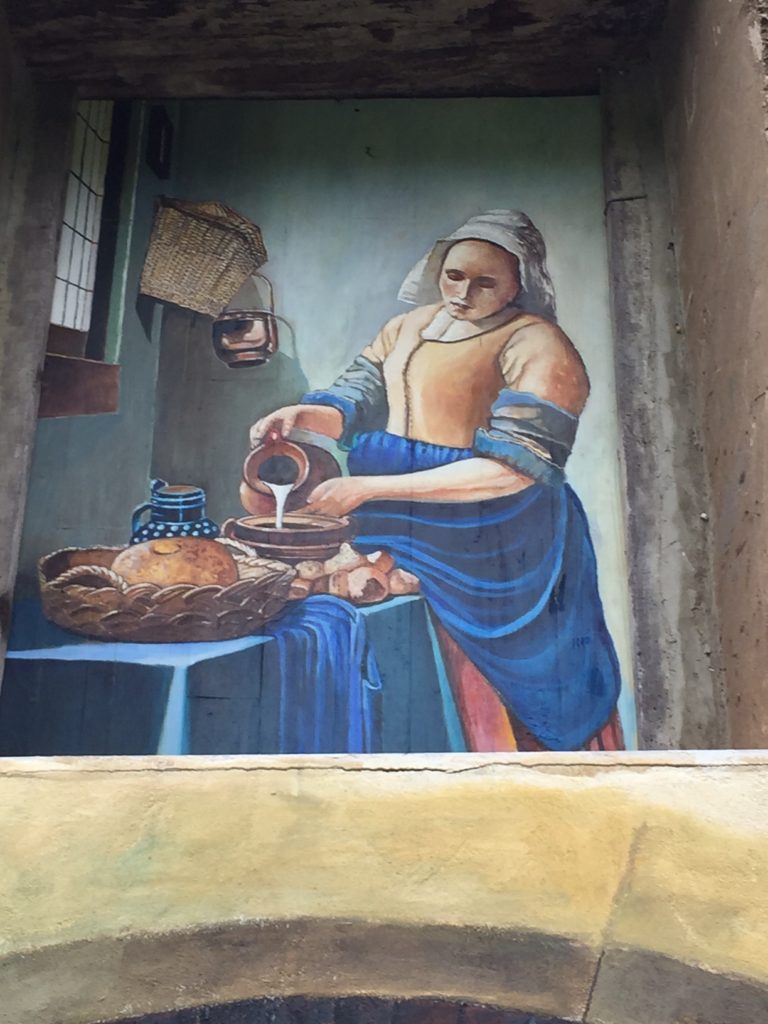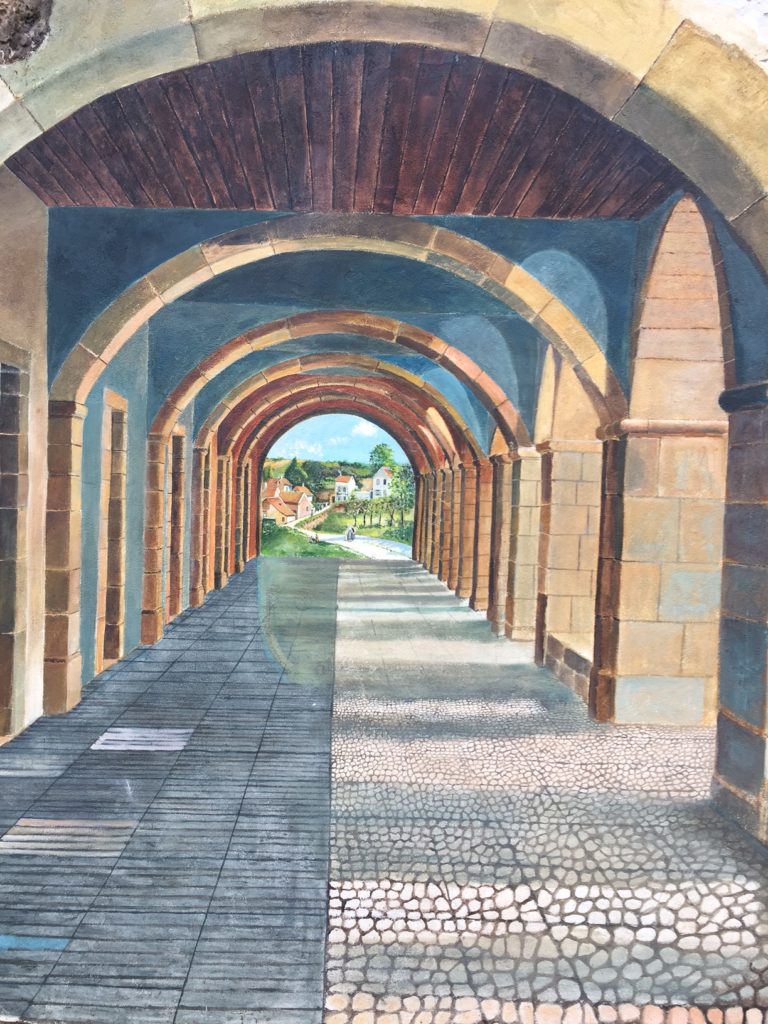postcards from the crossroads
I like this farmer
tall and thin
like my own
grandfather
he has stopped
to tend his cows
my grandfather
had cows
before
I existed
cows in
our family
with names
and bells
for him to find
them I will
hang bells
for him
to find
me
So much happens in a day. I never remembered it all. Sometimes, I forgot to note small moments.
Like the morning I went to find coffee at the tiny tea shop. Walking down from the hills into town,
I took a back street past the market. On a tall, dark, wooden gate surrounding a walled courtyard,
I saw an artfully lettered sign. One narrow door of the gate stood open. Carefully fitting myself and my pack through this gateway, I stepped in and stopped, looking all around me. Small trees stood among waxy-leaved bushes, flowers blushed from soft shadows, creeping vines racing to cover everything in between. Old bricks and iron patio tables and chairs formed stair-stepped seating within the garden. I left my pack and stick and entered the glass doors to the shop.
Inside, all was immaculate, white, pristine. I could already smell my daily eau de parfum, “Essence of Backpacker,” and suddenly felt particularly grungy, my boots dropping trail dirt on the white tile floor. As the frowning woman came to the counter to take my order, I realized the tea shop was connected to the back of a gracious hotel on the main street. I looked around me and saw the well-dressed guests at their tables, taking inconspicuous bites of croissant with small forks. Apologetically ordering a coffee, I made a hasty retreat back outside.
Sitting alone in the garden, sipping from my white cup, I studied the tree above me. Here, behind walls, a lemon tree. I had never seen one before. Across the path, I watched the only other soul in the courtyard, a tame rabbit, slowly hopping from its food bowl back to its small hutch.
It wasn’t claustrophobia I felt, but its cousin, Limitation, who had married Expectations. Far too keen my sympathy for the rabbit in the courtyard garden, safe, fed, sheltered. Tamed. Lonely. I felt it from the people inside, as well. Hoisting my backpack, clicking my buckles, I looked back through the glass at the hotel guests, genteel and serene. Lucky to need to stay outside, stinky sweaty peregrina.
* * * * * * * * * * * * * * * * *
At lunchtime, I stopped at a sidewalk bench as I entered another town. I carried canned paté, light in aluminum, yet packed with protein and calories; I scooped it out with my spork onto torn bread, watching workmen emptying the trash cans at the park across the road.
Each week or so, I sent postcards home, sharing small moments. I sat on the bench and finished writing this week’s thoughts, then tucked the postcards back into the top of my pack. I refilled one of my water bottles at the peregrino fountain, then set off to find the post office.
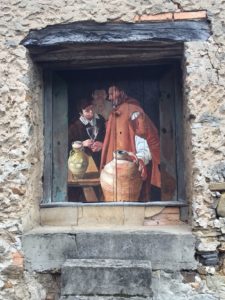 After several minutes, I realized I might have missed el correo. Stopping in a taverna, I struggled to catch the chauvinistic barman’s attention, who was deep in uninterruptible sports conversation, being ignored barside a common occurrence for un peregrina sola.
After several minutes, I realized I might have missed el correo. Stopping in a taverna, I struggled to catch the chauvinistic barman’s attention, who was deep in uninterruptible sports conversation, being ignored barside a common occurrence for un peregrina sola.
I turned to the transgender woman sitting at the end of the bar, and she patiently gave me slow directions, explaining that the post office was around the next corner and up the street. I had just enough Spanish words to say, “Thank you very much – and the yellow shirt is beautiful on you.” She smiled delightedly, and I got an enthusiastic wave goodbye.
The postal workers were unfailingly kind, all across Spain, helping me to buy my postcard stamps and always wishing me “Buen Camino!” as I struggled out the door in my pack.
I stepped in and out of experiences like stepping in and out of these doorways, one intention in mind, a slightly different conclusion usually following me out the door, food for thought on every bench and bubbling out of every roadside fountain. As people went about their ordinary lives, I was being given an extraordinary glimpse within, and paradoxically, this closeness felt expansive.
I waved to farmers on tractors in their fields, and they waved back. Yesterday, a farmer backed his blue tractor out of his farm driveway into the road. Then, at his command, his small dog came running and hopped up the steps into the tractor cab with him, and they set off down the road together.
I saw babies whose mothers smiled. I saw old men who did not. I saw old men who did. I saw an old woman praying her rosary just inside the doorway of an ancient church, its heavy Romanesque arches over the doorways depicting pagan images at the tops of the columns, while inside, Jesus still got crucified, classical music softly playing from hidden speakers.
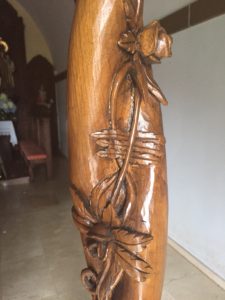 So many cowbells on so many cows; all the countryside sounded like church bells, which also rang out throughout the day. I got to go inside a tiny chapel to San Antonín because a workman was there to patch some plaster, and he waved me in with a quick hand and a nonchalant shrug. The wooden posts were carved with intricate roses, even the stems and leaves. Older geometric symbols adorned the choir loft.
So many cowbells on so many cows; all the countryside sounded like church bells, which also rang out throughout the day. I got to go inside a tiny chapel to San Antonín because a workman was there to patch some plaster, and he waved me in with a quick hand and a nonchalant shrug. The wooden posts were carved with intricate roses, even the stems and leaves. Older geometric symbols adorned the choir loft.
Last night, a grand total of five of us stayed at the albergue in Sebrayo. The hospitalero had left fresh lemons and two hardboiled eggs in the kitchen. I thought about the tea shop garden as I toasted my bread on the stove, sliced an egg onto it, and had a breakfast sandwich as I looked at my guidebook.
This was my last albergue on the Camino Norte. I squeezed lemon into my water, inhaling the fresh scent.
* * * * * * * * * * * * * * * * *
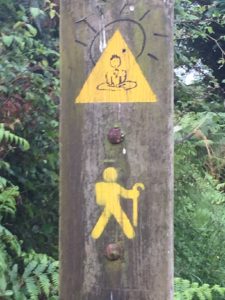 The rich enigma of going deeper within while going without, living outside, living outside the constraints of home and job and roles and expectations, had become a beautiful Gordian knot, loosening and expanding day by day, but always maintaining connection, always flowing. I had no desire to cut the knot, to conquer it by force like Alexander the Great. I only hoped to trace it, to see it for what it was. I just wanted to walk its path.
The rich enigma of going deeper within while going without, living outside, living outside the constraints of home and job and roles and expectations, had become a beautiful Gordian knot, loosening and expanding day by day, but always maintaining connection, always flowing. I had no desire to cut the knot, to conquer it by force like Alexander the Great. I only hoped to trace it, to see it for what it was. I just wanted to walk its path.
At last, here I was, the chapel at the fork in the road where the Camino Norte and the Camino Primitivo split. I stepped inside. So small, this space to contemplate our choices. I sat on a bench in the cool quiet, sipped some water, clearing my mind in the filtered light. I felt ready.
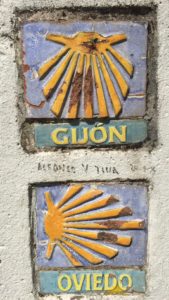 Stepping outside, I met the local woman who stocks a basket of snacks beside the chapel, next to the bench holding a sello stamp tied to a guest register book. She asked if I had water, and I showed her, and bought a plum for a few cents, so she was happy. And so was I.
Stepping outside, I met the local woman who stocks a basket of snacks beside the chapel, next to the bench holding a sello stamp tied to a guest register book. She asked if I had water, and I showed her, and bought a plum for a few cents, so she was happy. And so was I.
In the book, I wrote, “Each her own Camino.” I hiked on, the plum sweet and juicy, as the road led upward, into the high hills. I had stepped onto – into – the Primitivo.
